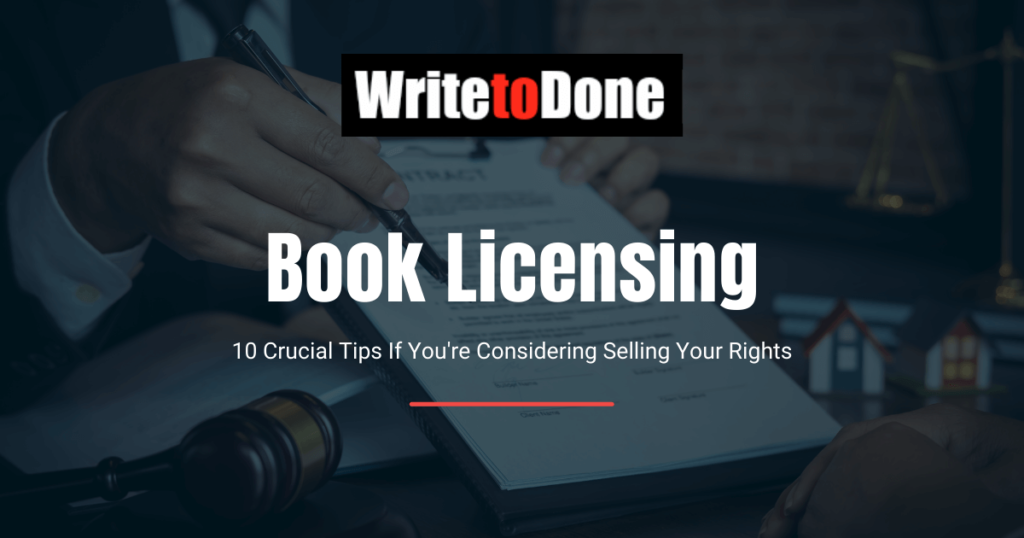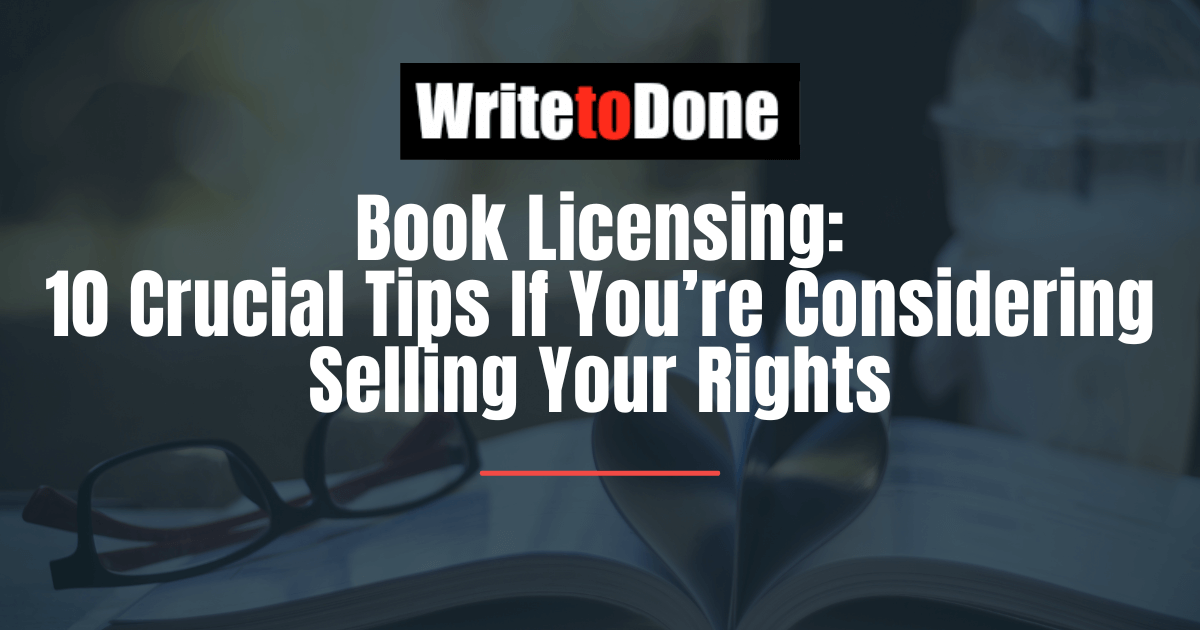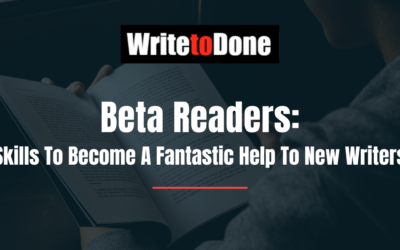You’re delighted that your self-published book is selling well.
But what if I told you that no matter how good your sales, you’re still leaving stacks of cash on the table?
You might not believe me. But think of your book – on bookshelves around the world. And why only bookshelves? Your writing can sell on e-book readers, i-devices, radio stations and screens, both big and little.
Do you see how much earning potential your writing has? All you need to do to earn more from your writing is to employ a simple yet neglected secret.
Book licensing.
Your book rights hold a huge and renewable revenue stream. The fact is, self-published authors don’t own just a potentially valuable book, they also own the rights to their work.
These rights can be licensed to produce the same book, in English, in different territories around the world – be it the United States, Canada, Australia, or India.
Rights can also be licensed for the book to be translated into different languages. With books being published in over 400 languages worldwide, that is a significant potential income.
Self-published authors lose thousands, maybe even millions, of dollars – simply because they don’t know how to maximize the opportunities that book rights and licensing offer them.
Here are ten questions self-published authors commonly ask on how they can use rights and licensing to earn more.

#1. What rights do I have over my self-published book?
You own your Intellectual Property (IP). A paperback book is just one product in the universe of IP that you own – other products include the hard-cover, e-book, and audio-book versions of the same book.
Then there are translations, new formats, media rights, permissions to quote from your work, and so on. You can keep selling the book you’ve published, while still having an ocean of IP left to license and monetize.
#2. I’ve been told my book is perfect for film – should I concentrate solely on those rights?
I hear this question a lot, especially with so many successful book-to-screen adaptations in recent times. The fundamentals remain the same.
It’s good to know what film companies are looking for. Most are quite specific about the kinds of books they’re interested in. Contact individual film companies to understand exactly what they want from a book, rather than starting with “my book would make a great film.”
For many authors, this is the ultimate goal.
You can – and should – pursue film rights for your book, but it’s essential that you continue to investigate all potential rights and licensing options.
#3. Don’t I need special connections / contacts to license my books?
Contacts help, but they’re not a necessity. When I began my first publishing company, I had no contacts at all. I made a list, contacted as many publishers as I could, and licensed our second novel, which was then published in seven editions and four languages.
That was a result of research and persistence – nothing else. Today, it is easy for you to contact publishers around the world. But it’s up to you to do the groundwork.
As a self-published author, it pays to think of yourself as a small business and brand, with rights and licensing as your main sales tools.
#4. How can I sell book rights when I can’t afford to travel to book fairs held the world over?
Some major publishers have to participate in major book fairs to secure certain rights and licensing deals, but this is no longer essential.
There are many forums available for you to showcase your work, and contact potential publishing partners across the globe.
You can also be represented by rights professionals, or include your titles in rights magazines distributed at book fairs all over the world.
#5. Can I sell rights and license my book before I’ve finished writing my book?
Yes, if you’re Dan Brown or J.K. Rowling, but certainly not as a debut writer, particularly in fiction.
Your sole focus should be to work on your writing, getting it as polished and ready for publication as possible. Only then is it time to showcase it and send it out to potential licensees.
#6. Do I need to understand international markets and adapt my work accordingly?
Yes and no. Write the book you want to write. Aiming your work at specific markets is more likely to distract you and weaken the overall book.
If your work is good enough and you do manage to get it in front of the right people, then it will have a good chance of being licensed.
It’s worth thinking about how, and why, your work might appeal in different territories, languages, formats and so on, as appropriate. Think about the places that feature in the book, the origins of the characters, and anything that might connect your work to other countries. This will show you a potential connection and hook for a specific territory or audience.
#7. If I have self-published, will this put off potential licensees?
Not at all. Self-publishing, rather than being frowned upon, is finally being embraced, with many mainstream publishers actively focusing on acquiring self-published manuscripts.
For example, Mary Wood, one of our self-published authors, recently received a seven-book deal from Pan Macmillan. To increase your chances of landing a book deal, check out this article.
#8. Would it help to get into certain markets if I had my book translated first?
Not usually. Publishers typically work with a previously vetted set of translators. Also, they may wish to take advantage of available grants, if any, for translations.
Getting your book translated yourself with a view to licensing it is most often a waste of time and money.
#9. How will I know if the company buying the book license is reputable?
Thanks to the internet, it’s easy to find information about any individual or organization.
If you’re evaluating a publisher as a potential licensee, see what else they’ve published. Find out how long they’ve been in business. Do they have an office address? Are they easy to contact?
Do your research thoroughly, and you will know whether or not you should consider licensing your work to them.
You can also contact organizations of potential licensees who meet certain key criteria. Because they meet a minimum cut off, you can be relatively assured of their authenticity.
#10. If I receive an offer, how will I know if it’s any good? How will I deal with the contract?
If you’re an author and don’t have an agent to advise you, there are many places you can seek – and get – good advice.
In the UK, the Society of Authors advises across a wide variety of offers and contracts.
Organizations like the Alliance of Independent Authors are introducing standard licensing terms, which will hopefully make the rights process a lot simpler.
Wherever you’re based, a good lawyer will help you negotiate a favorable contract. If you want to see how people approach buying the rights to a book, check out this article.
Book Licensing Outlook
The message is clear: your rights are not limited to the physical book you author – they are much greater than that.
As an independent self-published author, you now know how to earn more from your writing. You need to be aware of the rights you hold, and their potential to net you many times the income you’ve been bringing in thus far.
Apply what you’ve learned above, and you could easily have a six- or seven-figure global business at your fingertips.
Do you have any other questions on how to use book rights and licensing to earn more? Ask me in the comments below.
Ready to learn how to sell more books and make more money from your books? We teamed up with Self-Publishing School to provide this free training.

















